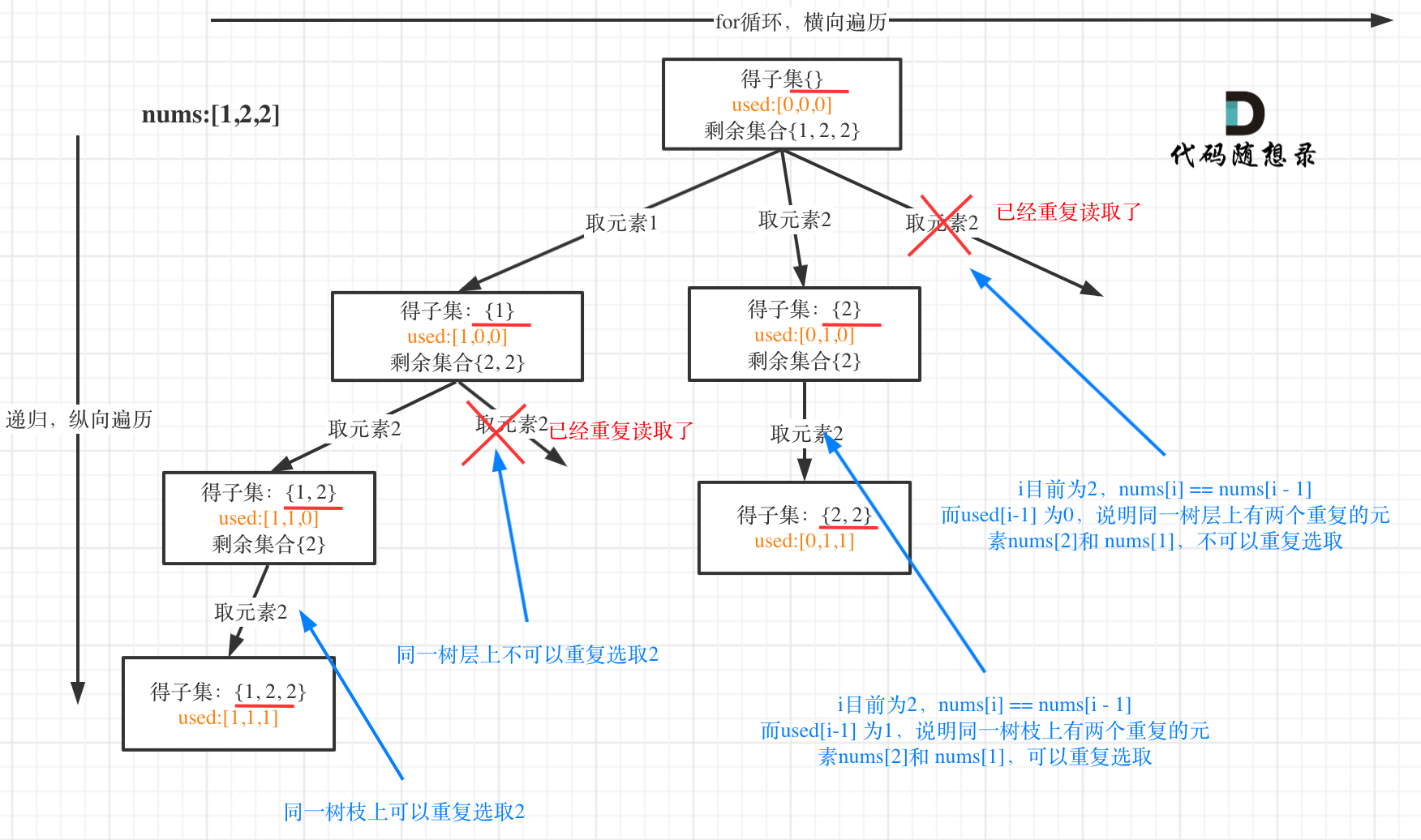一、核心要义
1.类元编程时指在运行时创建或定制类的技艺
2.类是一等对象,因此任何时候都可以使用函数新建类,而无需使用class关键字
3.类装饰器也是函数,不过能够审查、修改,甚至把被装饰的类替换为其它类。
4.元类(type类的子类)类编程最高级的工具:使用元类可以创建具有某种特质的全新类种,例如我们见过的抽象基类。
5.所有类都是type类的实例,但只有元类既是type类的实例,也是其子类。
温馨提示:除非开发框架,否则不要编写元类。
二、代码示例
1、类工厂函数
#!/usr/bin/env python
# -*- coding: utf-8 -*-
# @Time : 2024/3/17 18:24
# @Author : Maple
# @File : 01-类工厂函数.py
# @Software: PyCharm
def record_factory(cls_name,field_names):
try:
field_names = field_names.replace(',',' ').split(' ')
except AttributeError:
pass
field_names = tuple(field_names)
def __init__(self,*args,**kwargs):
# 属性键值对:处理元组参数
attrs = dict(zip(self.__slots__,args))
# 属性键值对:处理key-value参数
attrs.update(**kwargs)
for name,value in attrs.items():
# 为实例对象设置属性
setattr(self,name,value)
def __iter__(self):
for name in self.__slots__:
yield getattr(self,name)
def __repr__(self):
# 注意zip(self.__slots__,self)中后面一个self,其实是一个元组(各个属性对应的值)遍历,因为实例实现了__iter__方法,
values = ', '.join('{}={!r}'.format(*i) for i in zip(self.__slots__,self))
return '{}({})'.format(self.__class__.name,values)
# 组件类属性字典
cls_attrs = dict(__slots__ = field_names,
__init__ = __init__,
__iter__ = __iter__,
__repr__ = __repr__)
# 返回一个类
return type(cls_name,(object,),cls_attrs)
if __name__ == '__main__':
# 1.创建一个Dog的类(也是一个对象-万物皆对象)
Dog1 = record_factory('Dog','name,age,gender')
d1 = Dog1('旺财',18,'母') # <member 'name' of 'Dog' objects>(name='旺财', age=18, gender='母')
print(d1) # <member 'name' of 'Dog' objects>(name='旺财', age=18, gender='母')
# 2.创建另外一个Dog类(也是一个对象-万物皆对象)
Dog2 = record_factory('Dog','name,age,gender')
d2 = Dog2('阿来', 20, '公')
print(d2) # <member 'name' of 'Dog' objects>(name='阿来', age=20, gender='公')
# 3.Dog2和Dog1不是同一个对象
print(id(Dog2) == id(Dog1)) #False
print(Dog1 == Dog2) # False
2、类工厂函数
#!/usr/bin/env python
# -*- coding: utf-8 -*-
# @Time : 2024/3/17 20:54
# @Author : Maple
# @File : 02-定制描述符的类装饰器.py
# @Software: PyCharm
import abc
def entity(cls):
#keyde的值类似:weight
#attr的值类似:<__main__.Quantity object at 0x00000262A8BBA3A0>,是一个描述符对象
for key,attr in cls.__dict__.items():
if isinstance(attr,Validated):
# type_name类似:Quantity
type_name = type(attr).__name__
attr.storage_name = '_{}#{}'.format(type_name,key)
return cls
class AutoStorage:
__counter = 0
def __init__(self):
cls = self.__class__
prefix = cls.__name__
index = cls.__counter
self.storage_name = '_{}#{}'.format(prefix,index)
cls.__counter += 1
def __get__(self, instance, owner):
if instance is None:
return self
else:
return getattr(instance,self.storage_name)
def __set__(self, instance, value):
setattr(instance,self.storage_name,value)
class Validated(abc.ABC,AutoStorage):
def __set__(self, instance, value):
value = self.validate(instance,value)
super().__set__(instance,value)
@abc.abstractmethod
def validate(self,instance,value):
"""retuen validated value or raise ValueError"""
class Quantity(Validated):
"""a number greater than zero"""
def validate(self,instance,value):
if value > 0:
return value
else:
raise ValueError('value must be >0')
class NonBlank(Validated):
"""a string with at least one non-space character"""
def validate(self,instance,value):
value = value.strip()
if len(value) == 0:
raise ValueError('value can not be empty or blank')
else:
return value
# 用entity装饰LineItem类
# 默认的属性名变成类似_Quantity#weight和_Quantity#price,_NonBlank#price
@entity
class LineItem:
description = NonBlank()
weight = Quantity()
price = Quantity()
def __init__(self,description,weight,price):
self.description = description
self.weight = weight
self.price = price
def subtotal(self):
return self.weight * self.price
def __repr__(self):
return 'LineItem =({},{},{})'.format(self.description,self.weight,self.price)
if __name__ == '__main__':
com = LineItem('Computer', 10, 1000)
# 查看实例属性的名
print(com.__dict__) # {'_NonBlank#description': 'Computer', '_Quantity#weight': 10, '_Quantity#price': 1000}3、导入时和运行时比较
(1) evalsupport.py
#!/usr/bin/env python
# -*- coding: utf-8 -*-
# @Time : 2024/3/18 21:03
# @Author : Maple
# @File : evalsupport.py
# @Software: PyCharm
print('<[100]> evalsupport module start')
def deco_alpha(cls):
print('<[200]> deco_alpha')
def innner_1(self):
print('<[300]> deco_alpha:inner_1')
cls.method_y = innner_1
return cls
# 注意MetaAleph继承type,因此它是一个元类
class MetaAleph(type):
print('<[400]> MetaAleph body')
def __init__(cls,name,bases,dict):
print('<500> MetaAleph.__init__')
def inner_2(self):
print('<600> MetaAleph.__init__:inner_2')
cls.method_z = inner_2
print('<[700]> evalsupport module end')(2) evaltime.py
#!/usr/bin/env python
# -*- coding: utf-8 -*-
# @Time : 2024/3/18 20:51
# @Author : Maple
# @File : evaltime.py
# @Software: PyCharm
from evalsupport import deco_alpha
print('<[1]> evaltime module start')
class ClassOne(object):
print('<[2]> ClassOne body')
def __init__(self):
print('<[3]> ClassOne.__init__')
def __del__(self):
print('<[4]> ClassOne.__del__')
def method_x(self):
print('<[5]> ClassOne.method_x')
class ClassTwo(object):
print('<[6]> ClassTwo body')
@deco_alpha
class ClassThree(object):
print('<[7]> ClassThree body')
def method_y(self):
print('<[8]> ClassThree.method_y')
class ClassFour(object):
print('<[9]> ClassFour body')
def method_y(self):
print('<[10]> ClassFour.method_y')
if __name__ == '__main__':
print('<[11]> ClassOne tests', 30 * '.')
one = ClassOne()
one.method_x()
print('<[12]> ClassThree tests', 30 * '.')
three = ClassThree()
three.method_y()
print('<[13]> ClassFour tests', 30 * '.')
four = ClassFour()
four.method_y()
print('<[14]> evaltime module end')(3) 导入时
① 打开Python Console窗口

② 执行import evaltime
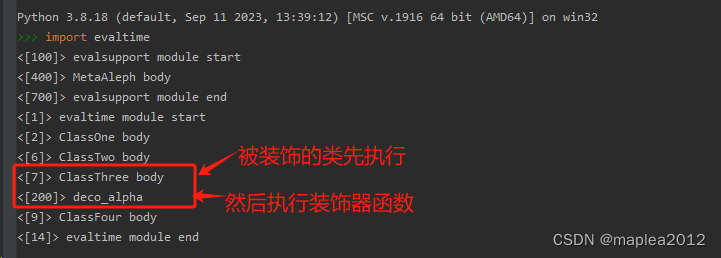
Tips:此时evaltime.py文件的name = __main__部分并没有执行
(4) 运行时
注意:在Teminal窗口执行

重点关注部分:
No1:因为@deco_alpha装饰器修改了ClassThree的method_y方法为inner_1,因此当three调用method_1的时候,inner_1方法会调用,并输出<[300]> deco_alpha:inner_1

No2: 虽然ClassFour继承了ClassThree,但是@deco_alpha装饰器并不会作用在ClassFour上,因此four.method_y的时候,并没有输出<[300]> deco_alpha:inner_1
4、元类的运行顺序
(1)evaltime_meta.py
#!/usr/bin/env python
# -*- coding: utf-8 -*-
# @Time : 2024/3/18 21:03
# @Author : Maple
# @File : evalsupport.py
# @Software: PyCharm
print('<[100]> evalsupport module start')
def deco_alpha(cls):
print('<[200]> deco_alpha')
def innner_1(self):
print('<[300]> deco_alpha:inner_1')
cls.method_y = innner_1
return cls
# 注意MetaAleph继承type,因此它是一个元类
class MetaAleph(type):
print('<[400]> MetaAleph body')
def __init__(cls,name,bases,dict):
print('<500> MetaAleph.__init__')
def inner_2(self):
print('<600> MetaAleph.__init__:inner_2')
cls.method_z = inner_2
print('<[700]> evalsupport module end')(2)导入时

重点说明
1. 创建ClassFive时,调用了MetaAleph.__init__方法
2. 创建ClassFive的子类ClassSix时,同样会调用MetaAleph.__init__方法
(3)运行时
要点:元类会改变被修饰的类的一些特性
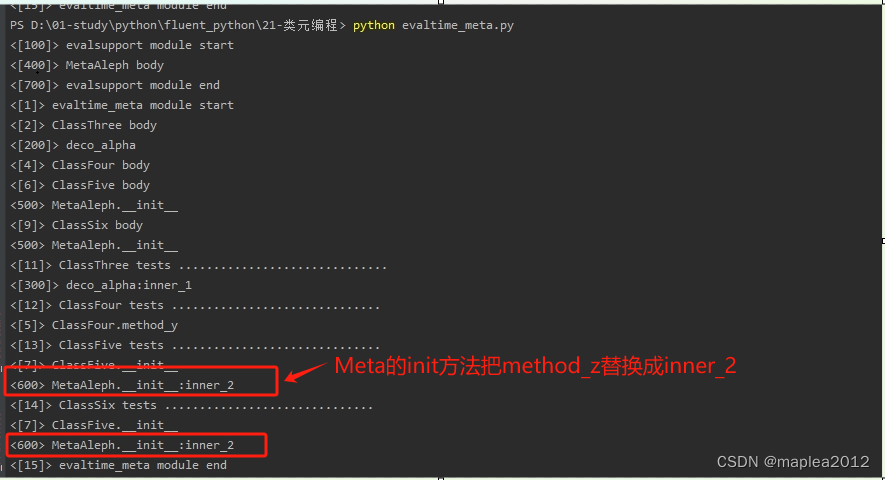
和装饰器@deco_alpha的区别是,MetaAleph的作用在ClassFive的子类ClassSix种仍然起作用。
5、定制描述符的元类
#!/usr/bin/env python
# -*- coding: utf-8 -*-
# @Time : 2024/3/19 20:51
# @Author : Maple
# @File : 04-定制描述符的元类.py
# @Software: PyCharm
import abc
class AutoStorage:
__counter = 0
def __init__(self):
cls = self.__class__
prefix = cls.__name__
index = cls.__counter
self.storage_name = '_{}#{}'.format(prefix,index)
cls.__counter += 1
def __get__(self, instance, owner):
if instance is None:
return self
else:
return getattr(instance,self.storage_name)
def __set__(self, instance, value):
setattr(instance,self.storage_name,value)
class Validated(abc.ABC,AutoStorage):
def __set__(self, instance, value):
value = self.validate(instance,value)
super().__set__(instance,value)
@abc.abstractmethod
def validate(self,instance,value):
"""retuen validated value or raise ValueError"""
class Quantity(Validated):
"""a number greater than zero"""
def validate(self,instance,value):
if value > 0:
return value
else:
raise ValueError('value must be >0')
class NonBlank(Validated):
"""a string with at least one non-space character"""
def validate(self,instance,value):
value = value.strip()
if len(value) == 0:
raise ValueError('value can not be empty or blank')
else:
return value
class EntityMeta(type):
def __init__(cls, name, bases, attr_dict):
super().__init__(name, bases, attr_dict)
for key, attr in attr_dict.items():
if isinstance(attr, Validated):
type_name = type(attr).__name__
attr.storage_name = '_{}.{}'.format(type_name, key)
class Entity(metaclass=EntityMeta):
"""带有验证字段的业务实体"""
# LineItem是 Entity 的子类,而子类可以继承父类的元类特性
# 因此LineItem类也会被EntityMeta管控
class LineItem(Entity):
description = NonBlank()
weight = Quantity()
price = Quantity()
def __init__(self,description,weight,price):
self.description = description
self.weight = weight
self.price = price
def subtotal(self):
return self.weight * self.price
def __repr__(self):
return 'LineItem =({},{},{})'.format(self.description,self.weight,self.price)
if __name__ == '__main__':
com = LineItem('Computer', 10, 1000)
# 查看实例属性的名
print(com.__dict__) # {'_NonBlank#description': 'Computer', '_Quantity#weight': 10, '_Quantity#price': 1000}6、元类的prepare方法
#!/usr/bin/env python
# -*- coding: utf-8 -*-
# @Time : 2024/3/19 21:10
# @Author : Maple
# @File : 05-元类的prepare方法.py
# @Software: PyCharm
import abc
import collections
class AutoStorage:
__counter = 0
def __init__(self):
cls = self.__class__
prefix = cls.__name__
index = cls.__counter
self.storage_name = '_{}#{}'.format(prefix, index)
cls.__counter += 1
def __get__(self, instance, owner):
if instance is None:
return self
else:
return getattr(instance, self.storage_name)
def __set__(self, instance, value):
setattr(instance, self.storage_name, value)
class Validated(abc.ABC, AutoStorage):
def __set__(self, instance, value):
value = self.validate(instance, value)
super().__set__(instance, value)
@abc.abstractmethod
def validate(self, instance, value):
"""retuen validated value or raise ValueError"""
class Quantity(Validated):
"""a number greater than zero"""
def validate(self, instance, value):
if value > 0:
return value
else:
raise ValueError('value must be >0')
class NonBlank(Validated):
"""a string with at least one non-space character"""
def validate(self, instance, value):
value = value.strip()
if len(value) == 0:
raise ValueError('value can not be empty or blank')
else:
return value
class EntityMeta(type):
@classmethod
def __prepare__(metacls, name, bases):
# 1.该方法先于new和init方法执行
# 2.该方法必须返回一个映射
# 3.该方法的返回值会传递给init方法的最后一个参数(本例是attr_dict)
return collections.OrderedDict()
def __init__(cls, name, bases, attr_dict):
# 注意:此时attr_dict是OrderedDict对象,其特点是先进先出
super().__init__(name, bases, attr_dict)
# 为类添加一个类属性
cls._filed_names = []
for key, attr in attr_dict.items():
if isinstance(attr, Validated):
type_name = type(attr).__name__
attr.storage_name = '_{}.{}'.format(type_name, key)
cls._filed_names.append(key)
class Entity(metaclass=EntityMeta):
"""带有验证字段的业务实体"""
@classmethod
def field_names(cls):
for key in cls._filed_names:
yield key
# LineItem是 Entity 的子类,而子类可以继承父类的元类特性
# 因此LineItem类也会被EntityMeta管控
class LineItem(Entity):
description = NonBlank()
weight = Quantity()
price = Quantity()
def __init__(self, description, weight, price):
self.description = description
self.weight = weight
self.price = price
def subtotal(self):
return self.weight * self.price
def __repr__(self):
return 'LineItem =({},{},{})'.format(self.description, self.weight, self.price)
if __name__ == '__main__':
com = LineItem('Computer', 10, 1000)
# 查看实例属性的名
print(com.__dict__) # {'_NonBlank#description': 'Computer', '_Quantity#weight': 10, '_Quantity#price': 1000}
# 按照添加字段的顺序产出字段的名字
for name in LineItem.field_names():
"""description
weight
price
"""
print(name)三、结语
历史将近4个月,《流畅的Python》完结撒花, 下一站《Python数据科学》,相聚有时,后会有期。



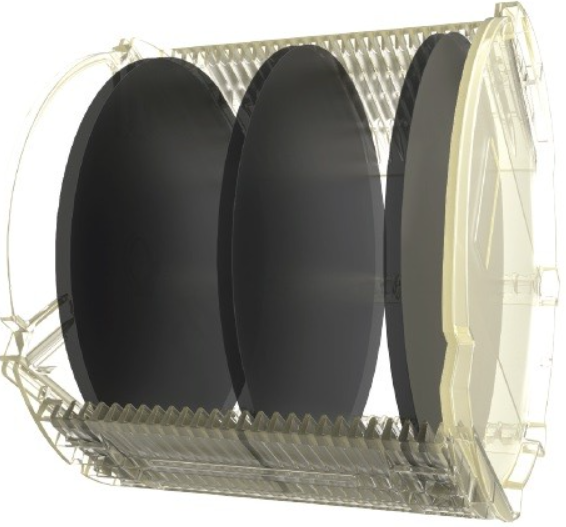



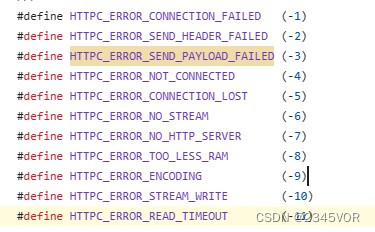



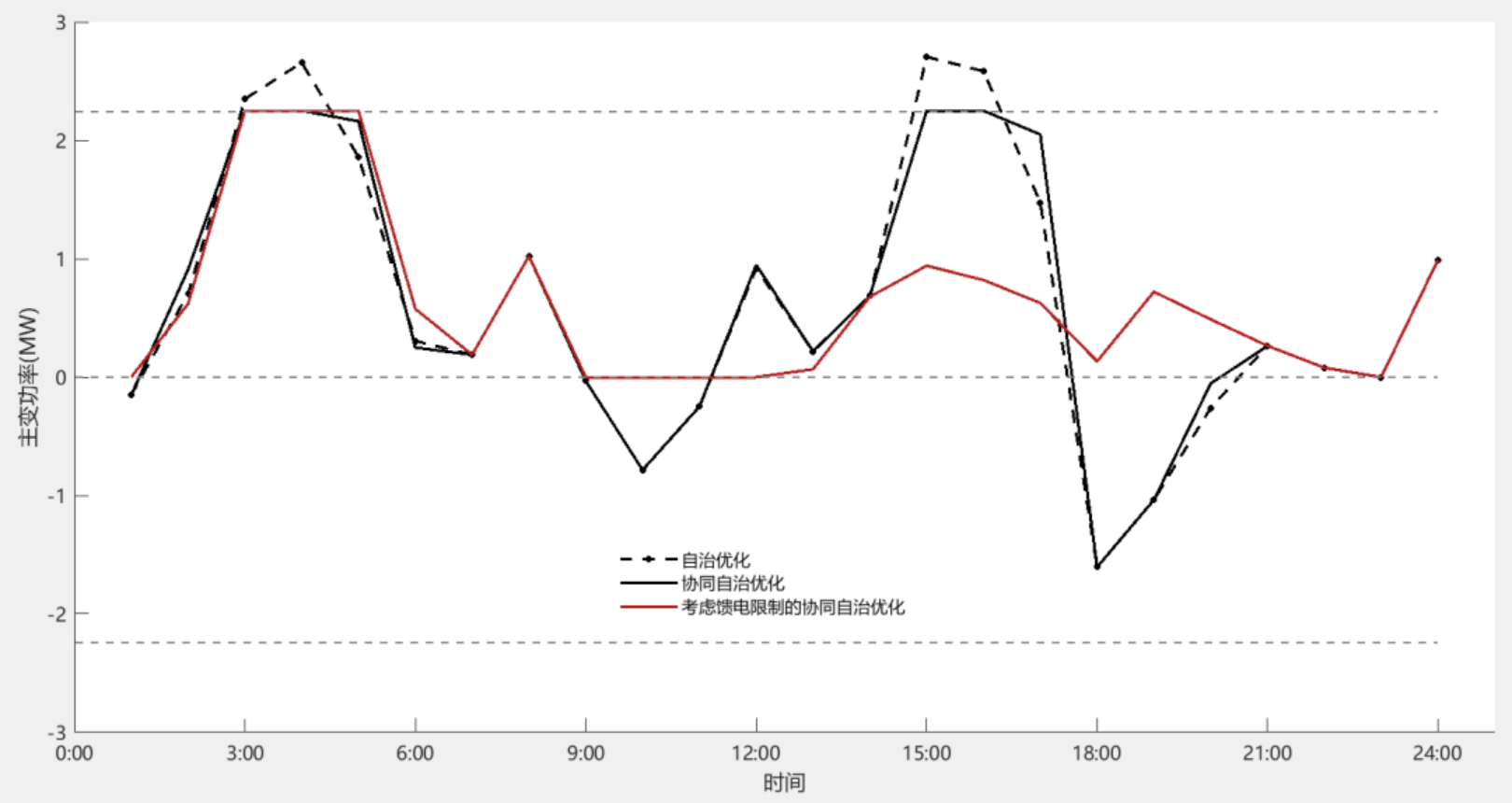

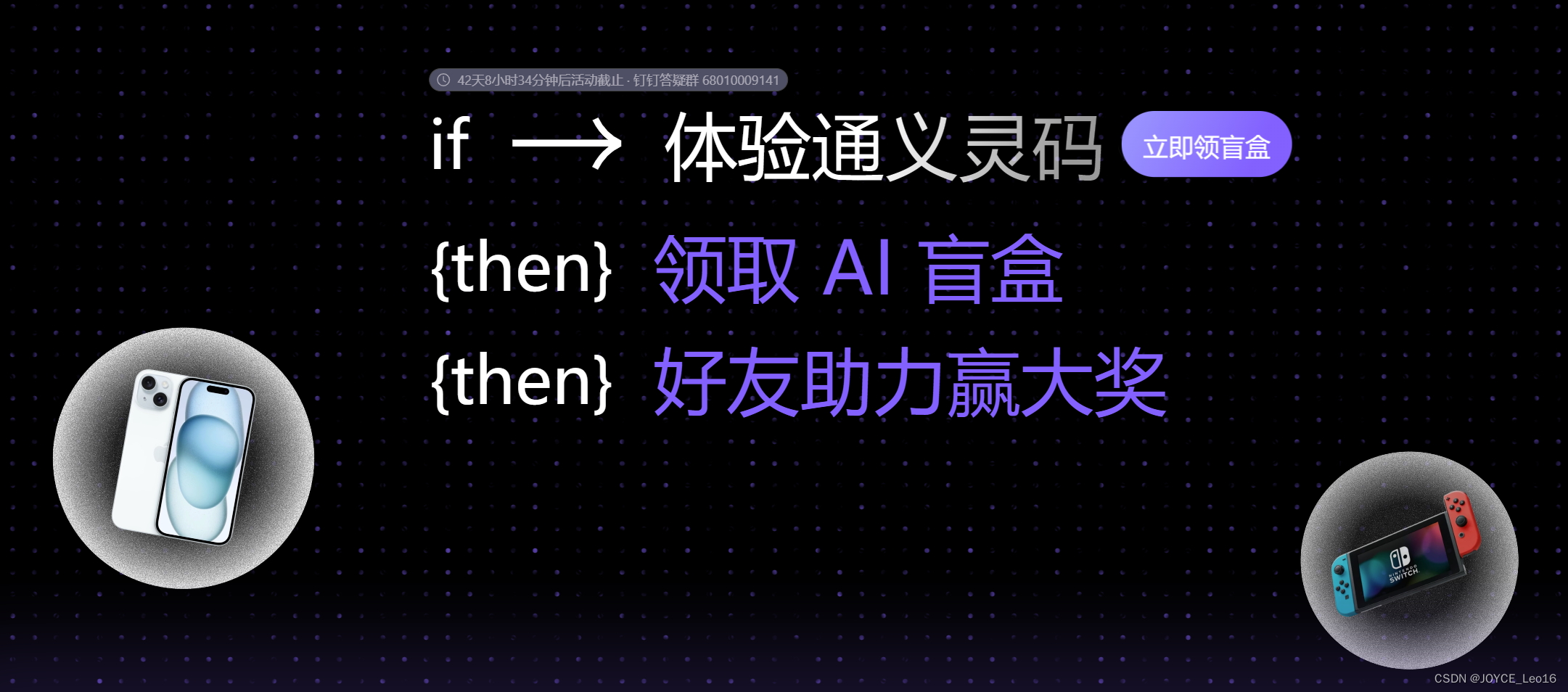
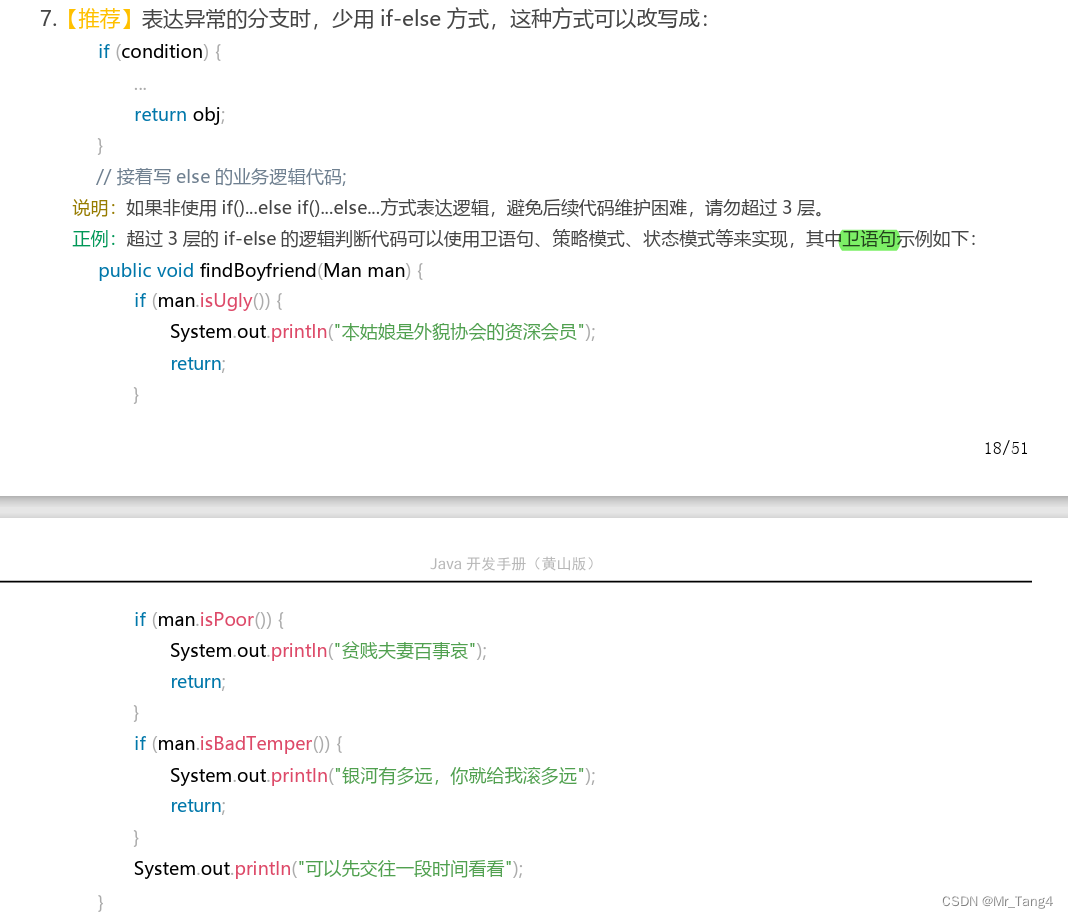
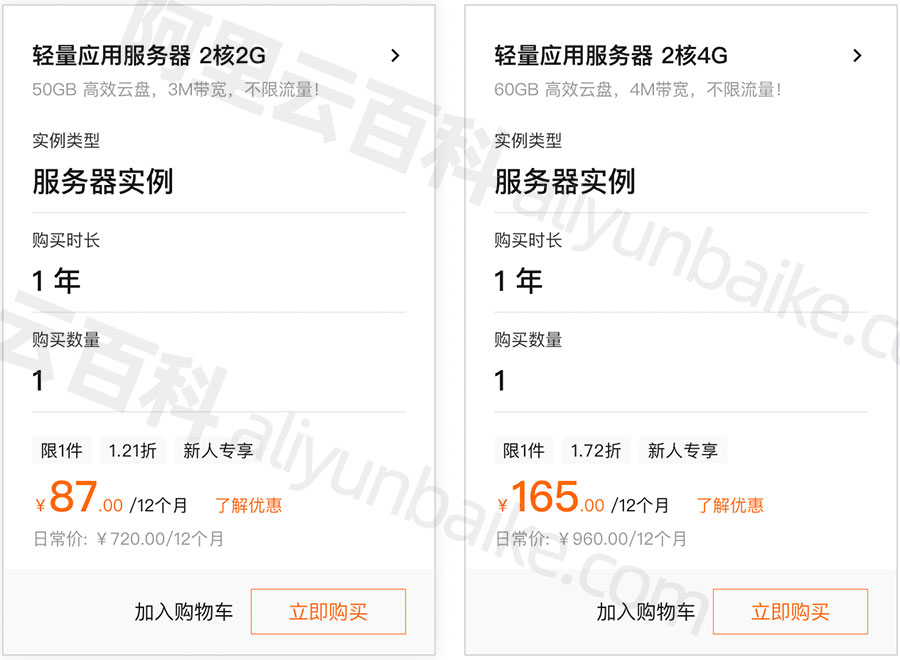
![[QJS xmake] 非常简单地在Windows下编译QuickJS!](https://img-blog.csdnimg.cn/direct/406aaa7d7798422091d8d50417c02d85.png#pic_center)


